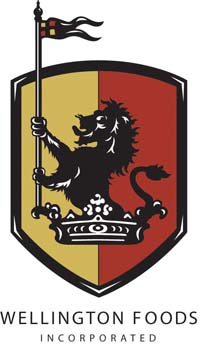Wellington Foods Creates a Healthy Enterprise
 Established in 1974, privately-held Wellington Foods Inc. is a custom contract formulator, manufacturer and packager of nutritional supplements in both liquid and powdered forms. Wellington's customers are branded distributors in the nutritional supplement industry, many of whom lack their own manufacturing capabilities and benefit from the use of Wellington as a contract manufacturer.
Established in 1974, privately-held Wellington Foods Inc. is a custom contract formulator, manufacturer and packager of nutritional supplements in both liquid and powdered forms. Wellington's customers are branded distributors in the nutritional supplement industry, many of whom lack their own manufacturing capabilities and benefit from the use of Wellington as a contract manufacturer. The company packs liquids in all sizes, from one ounce to 32 ounces, as well as in gallon jugs and drums. In powders, Wellington specializes in dry, blended beverage bases. The major powder product categories include soy and whey protein, meal replacement formulas, fiber supplements and vitamin and mineral blends. Powdered products are also packed in a wide variety of packaging, from foil-lined composite cans, to plastic tubs and glass jars. Wellington produces in excess of 600 finished-product SKUs, and Wellington-manufactured products primarily end up on the shelves of some of the nation's largest retailers, including Wal-Mart, Costco, Target, Kroger, Whole Foods and GNC.
Supply Challenge
Wellington's previous supply chain system was not suited to handle process manufacturing, and because it was a discrete manufacturing application, it had functional limitations in inventory control. The company had difficulty dealing with unit-of-measure conversions and handling yield and scrap issues.
"Additionally, we needed to automate several of our critical good manufacturing practice functions such as lot traceability and quality documentation," says Tony Harnack, president and COO, Wellington Foods. "As a process manufacturing business, we needed a better way to control our inventory without the constant correction for errors that resulted from rounding within the bill of materials, or yield loss from the production process."
A Complete Package
Wellington Foods turned to CDC Software, a wholly-owned subsidiary of CDC Corporation, for its Ross Enterprise suite of enterprise resource planning (ERP) applications. "We chose Ross Enterprise over several other competitors because it offered a fully integrated solution that matched our needs," Harnack explains.
Implementation began in February 2005, but Harnack notes that the process manufacturing implementation took longer and required an effort on Wellington's part to get its data into the right shape. This process served as an opportunity for the company to organize its bill of material structure and review all of its manufacturing processes to confirm that operations were as efficient as possible. With the help of a CDC Software Ross Enterprise financial or manufacturing consultant, the company transitioned into this solution as its primary system, "managing everything from customer and vendor information to inventory control and production," adds Harnack.
The ERP solution is also the main tool used for Wellington's supply chain management. Harnack says that the system has given the company complete visibility of purchases and vendor history. It can drill down into each record to extract necessary information, dump data down into Excel to be sorted and sifted; and access data on specific materials purchased. Wellington can "quickly find a list of vendors from whom we have purchased this material in the past. This gives us a tool to competitively source for both price and availability."
Certifiable Results
The implementation of the new system resulted in many benefits for Wellington. "However, no benefit has been more important to our business than our ability to demonstrate competence to customers in critical quality areas," Harnack says.
The organization and data processes have improved. The information that was once difficult and time-consuming to compile is now accessible by a single user in a short period of time. Bi-directional lot traceability was previously a slow and labor intensive process, but now this function can be performed quickly and demonstrates capability to both regulatory agencies as well as customers.
"Our ability to better control our inventory has allowed us to achieve certifications within our industry which would have previously been difficult or impossible to achieve. We were awarded certification as an organic manufacturing facility after our Ross Enterprise implementation," says Harnack, who adds that this designation required very detailed inventory control.
More to Come
Leveraging the solution in the future has presented Wellington more opportunities for growth. As its volume of transactions continues to increase for the company, this ERP system will be able to keep up with the volume. Additionally, because the regulatory environment has changed significantly in the industry history in the last few years, Wellington will continue to depend on the solution to demonstrate that same competency to regulatory agencies and auditors certifying industry standards.
Harnack encourages other companies that may be in the same situation to spend money on training. He believes that an investment such as Wellington's is only as good as the employees' ability to use it. Some other advice from Harnack includes investing in the creation of reports for all levels of your operation.
"Financial and management reports are usually first priority, but many departmental users struggle without easy access to important information because the investment has not been made in good reports. A reasonably small investment in report creation has saved us time and increased our efficiency throughout our organization," he concludes.
